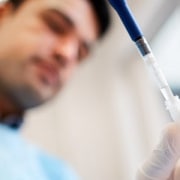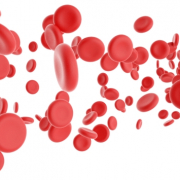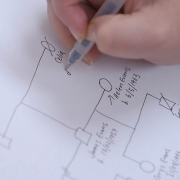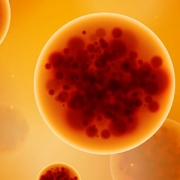‘New’ de novo variants linked to developmental disorders
How do gene variants affect our health? We look at a recent study that has newly identified 28 genes associated with developmental disorders
A new study combining healthcare and research data has found evidence linking 28 different gene variants with developmental disorders.
The work, a combined effort by researchers from the UK, US and the Netherlands, analysed the genomes of affected children and their biological parents together in order to find rare or previously undiscovered variants that had not been inherited, and were arising ‘de novo’ in the child.
De novo variants
De novo variants (DNVs) are a type of gene variant that is present in a child, but not in either of their parents. Instead of being inherited, they occur either when the sperm or egg cells are being formed, or in the early stages of embryonic development.
Most people are born with around 60 DNVs in their genomes, and for the most part they cause no harm at all. However, around 400,000 babies worldwide are born with changes that cause developmental problems, such as intellectual disability, epilepsy and heart defects.
While it is accepted that DNVs in protein-coding genes can cause of developmental disorders, many are rare so it is difficult to obtain enough evidence to show that a particular variant is the cause of a condition. As such, many gene variants linked to these disorders are still unidentified.
Studying trios
The large study, published in Nature, describes how researchers created a genomic database with linked healthcare records to search for unidentified DNVs associated with developmental disorders.
Researchers worked with a group of three samples – called a ‘trio’ – meaning they could analyse the genome of the child alongside the genomes of both biological parents in order to find variants that were de novo.
The researchers were able to look at over 31,000 anonymised exome trios by combining datasets from the Deciphering Developmental Disorders (DDD) study, Radboud University Medical Centre in the Netherlands and the US genetic testing firm, GeneDx. The size of the resulting dataset allowed more powerful statistical conclusions to be drawn than had previously been possible.
The analysis identified 285 genes with variants linked to developmental disorders, of which 28 had not been associated with these conditions before. The researchers concluded that this could lead to diagnoses for around 500 families.
The need for larger datasets
Previous studies, such as DDD, looked for similarities in the genomes of people affected by developmental disorders. This was effective in finding more common variants, but small datasets were a barrier in finding rarer ones.
Researchers suggest that there may currently be as many as 1,000 undiscovered DNVs that can cause developmental disorders, but that much larger datasets of genomes with linked health records would be required to identify them.
Currently around 60% of children born with a developmental disorder go undiagnosed, and the authors of this latest study estimate that around half of these children may have an unidentified gene variant.
“Caring for a child with a developmental disorder can be extremely challenging for a family, particularly when their child’s doctors don’t know what is causing their condition and are unable to make a diagnosis,” said consultant clinical geneticist at Addenbrooke’s Hospital in Cambridge, Dr Helen Firth. “A diagnosis can help families to access support networks, inform treatment for their child and help them to understand the risk for any further children they might have.”
–









